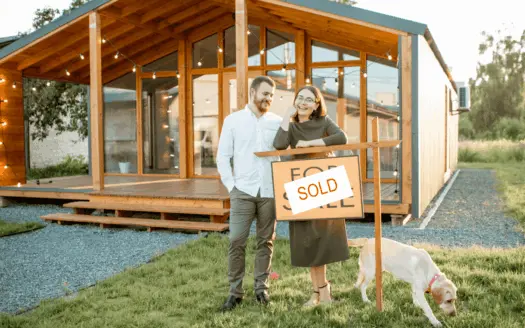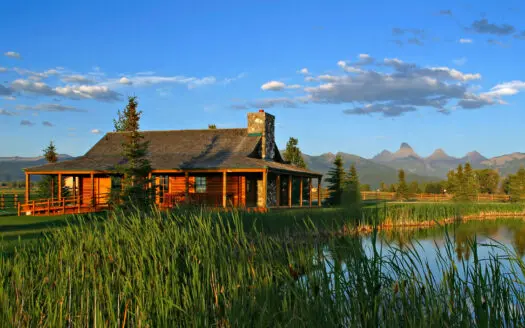How to Choose the Right Real Estate Agent
Updated April 10, 2025
More than half of the world’s population lives in urban areas. Many reasons for this are proximity to services, education, and potential jobs. However, there is a massive spike in young families, investors, and individuals migrating to rural communities.
Before the global pandemic, only about 0.01% of people moved to rural neighborhoods. Since 2021, that number has skyrocketed to 0.49%. The reasons for this are simple. People enjoy the freedom, space, and sense of a calmer pace of life compared to the often-breakneck speed of living in a city.
As more and more families focus on owning land for hunting, fishing, and a more naturally connected lifestyle, real estate agents are popping up left and right to help streamline the purchasing of homes. For example, in the State of Maine (a predominantly rural state), the number of real estate agents to handle the increased service demand has risen over 14% since 2019.
If you or a loved one is seeking to purchase land, homes, or other real estate in rural communities, you need a trustworthy agent to walk you through the process and keep your best interests in mind. Let’s look closer at how you can find the best real estate agent for your needs.
Why Work with a Real Estate Agent?
First, let’s clear something up quickly. A real estate agent is different from a real estate broker. You may hear the terms interchangeably, but the primary difference is that a broker has additional education and a higher level of licensing than agents. Many agents work for brokerages as a team. Odds are, if you’re seeking a high-value property or a commercial asset, you will want to seek a broker-supported agent.
Regardless of your choice, an experienced real estate agent is there to help you navigate the available properties on the market. They can key you into various trends, property valuations, and negotiation strategies to get the best value for your money.
These skills are beneficial when you’re seeking a more rural community. Finding a local real estate agent ensures you get the inside scoop on nearby hunting areas, swimming holes, weather conditions, and other concerns about your future home.
Many smaller towns or properties with large tracts of land are set in communities with a unique identity. A qualified and insightful local agent will outline those characteristics, so you get more value for your transaction than just numbers. You’ll learn the intrinsic invaluable points of your community that can be the key to unlocking high future returns.
Tips for Finding the Best Real Estate Agent
Once you have a target area in mind, it’s time to whittle down your selection of candidates to the best-fit real estate agents or brokers for your investment. These tips will help guide you on your way.
Start with a Budget
Before you contact anyone, you need to have a firm grip on your budget. One of the first questions an experienced real estate agent will ask is your buying power. You can get pre-approved for a mortgage through your preferred lender or have assets ready to move and validate before starting your search for an agent.
Sometimes, your chosen agents will have strong relationships with local banking or funding resources. This is a double-edged sword, as that can involve kickbacks to the agent. It’s best to have your assets in a row before contacting anyone. Then, if their connections offer better rates, you’re in an excellent position to make a choice.
Get Referrals and Start Your Search
Quality real estate agents live and breathe by the networks of previous, current, and referral clients they have. Talk to your friends, family, coworkers, neighbors, or even local Facebook groups to determine which agents will suit you.
A good referral from someone who received a great property for the value and had a seamless communication experience with that agent is worth its weight in gold. Just be sure to mention your property type. Many agents and brokers specialize in commercial, residential, rural (country) homes or lakeside properties.
Ask For Recommendations
Ask your local friends and family for real estate agent recommendations. If you’re new to your desired area or don’t have a trusted personal network, lean on local professionals and business-owners for advice. Reach out to mortgage lenders, appraisers or real estate attorneys for their recommendations. These individuals often work closely with agents, brokers and REALTORS ® and will have insight into which ones are ethical, dependable and efficient. The right agent should have a wide circle of influence and easily accessible testimonials of satisfied clients.
Online Research
Time to get to work! You want to examine the history and public persona of any candidates on your real estate agent shortlist. Start with:
- BBB Rating
- Local Community Memberships (Lion’s Club, Elks, Chamber of Commerce, etc.)
- Social Media Profiles (Especially LinkedIn)
- Customer Ratings & Comments
- Online Reviews and Web Presence
By the end, you should have a solid description of the agent, what they specialize in, and which clients seem to have the best relationships.
Check Credentials & References
Every agent you work with should be fully licensed and/or certified to work in your local area. If they cannot provide such licensing, you should immediately contact the state’s real estate board to ensure they are a “real” real estate agent.
The goal is to ensure legitimacy in their field. Remember, this is not only a financial situation but a legal one. You don’t want to run afoul of some long-forgotten law that leaves you dealing with a property in complete disrepair. The right agent will happily show you their credentials because they worked hard to achieve that status.
Interview Potential Agents
Interviewing potential real estate agents is the next step once you’ve thoroughly researched your agents and narrowed down your list. This is a crucial step that allows you to measure their professionalism, communication style and how well they understand your goals and your needs.
Schedule a phone call, Zoom session or in-person meeting to ensure you’re making the right choice. Come to the meeting prepared with your budget, expectations and dreams. Ask about their recent transactions and how many clients they’re currently managing. Get a sense of their workflow, accessibility and your compatibility. The right agent will be enthusiastic, prepared and transparent.
Meet with Multiple Agents
Organize your list of potential real estate agents in your target area. What will make the difference now is how they compare and contrast to one another in person or over a Zoom call.
- What is their typical home price range or neighborhoods?
- Do they have any preferred methods of communication?
- What are the details on commissions and fees?
The answers to questions like these should break down which of the three will be your top choice. Based on their responses, you can accurately assess which agent aligns best with your needs. Put them in order and then move on to the next steps.
Ask the Right Questions
Don’t be afraid to get into the nitty-gritty here. Ask questions like:
- What is their experience in the real estate market niche you are targeting?
- Do they work full- or part-time?
- How many clients are currently on their books?
- What listings are they actively managing?
- How many homes they have listed/sold in the last year?
- What is your typical marketing strategy?
- How will they handle negotiations?
Inquire About their Experience & Expertise
Understanding the experience of your real estate agent will set you up for success during your buying or selling journey. Ask how long they have worked with the specific type of real estate you are looking into. This is especially important if you are seeking a land, agricultural or niche property type.
You need an agent that understands mineral rights, septic systems or conservation easements –intricacies like these require a whole different set of skills compared to a residential or suburban real estate professional.
Clarify your Needs
Before you commit to an agent, make sure they understand exactly what your needs are and what you are looking for. How much acreage do you need? Are you looking for a fixer-upper or something more turn-key? Would you like to be off-grid or do you need seamless access to amenities?
Layout what your priorities, timeline and non-negotiables, so there’s no room for confusion or misunderstandings during the process. The right agent will listen carefully, ask follow-up questions and tailor their approach to suit your lifestyle and financial goals.
Key Qualities to Look For
Finding an agent is one thing –but finding the right agent is another. Identify key traits and qualities that can make or break your real estate experience.
Local Market Knowledge
Country homes and other rural properties come with a different set of challenges and opportunities compared to city-based residences. The right agent will know the local zoning laws, seasonal weather patterns, soil types and development trends of the area. This knowledge helps prevent disappointments, allowing you to make better and more informed decisions.
Strong Communication Skills
Clear, concise and timely communication is crucial for any business relationship. Whether it’s answering a phone call or text quickly or explaining a complex inspection report in layman’s terms, the right agent will be responsive, available and proactive.
Experience and Negotiation Skills
Look for an experienced agent with strong negotiation skills. Your real estate experience is not just about finding the best property –it’s about getting it for the best price too. The right agent will save you thousands by knowing how to read the market, position your offer and negotiate terms that work your favor. Discuss your real estate professional’s track record of successful closing to ensure you picked the right person.
Trust and Rapport
Trust is crucial in a real estate transaction as you will be spending a lot of time with your agent and will be sharing personal information. Do they follow through on what they promise? Do you feel heard and understood?
It’s essential that you build a sense of trust with your chosen real estate agent. Your gut will tell you whether this is someone why truly has your best interests at heart.
Trust Your Gut!
The final step is personal to you. It’s time to trust your gut. Schedule that call, and start exploring future properties to invest in.
Your gut is the best resource you have. If you don’t feel your gut has been helpful in the past, invite a friend or family member to go along for the ride with you. That way, you have a second opinion on hand to validate your feelings.
Working with a great real estate agent is a wonderful experience. They are incentivized to do the best for you because that is how they earn a living and grow their business. As long as you research ahead of time, you should have a fantastic time finding an excellent new property for investing, family vacations, or settling down inside.
The last tip to think about is always to read the bottom line of any contract. You should be properly prepared for any situation to make the best decision possible about your future.
Living in the fresh air of the countryside is a beautiful way to reconnect with nature, get freedom from crowds, and enjoy a much slower style. Find the agent that best fits that dream, and you will be rewarded with plenty of opportunities to choose from.
Find a United Country real estate agent near you and discover why we have been the leader in land sales for a century. Get started on your journey to Find Your Freedom® today!



